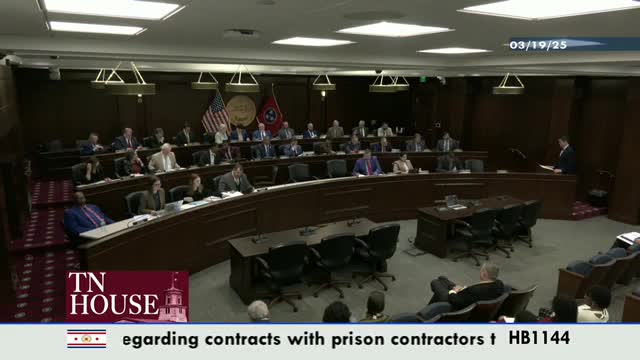Committee moves bill to reduce private-prison populations where inmate death rates are high
Get AI-powered insights, summaries, and transcripts
Subscribe
Summary
House Bill 1144 would require a 10% reduction in inmate population at private prisons whose death rates are double equivalent state facilities; sponsor cited inmate deaths and chronic understaffing and the measure was put on the calendar for further consideration.
Representative Boyd introduced House Bill 11,44 (reported as 11 44 in committee) saying the bill seeks to hold private prisons more accountable by reducing their inmate populations when the facility’s death rate is double that of an equivalent state-operated prison. Boyd said the bill is a response to a 2023 inmate death at a private facility and other concerns about violence and understaffing.
"What this bill seeks to do is to hold our private prisons more accountable," Boyd said, and he asked the committee to consider testimony from an affected family member; the committee ultimately rolled the bill to the hill of the calendar after the sponsor said his witness was not on the public-list for full committee testimony.
Committee members pressed Boyd for data. An assistant provided figures during a brief legal/clerical interlude: "Of the CoreCivic deaths in fiscal year '23 were 68 deaths of the 144 total deaths. So about 47% of them for the private prisons," the assistant said on the record. Members discussed chronic understaffing at private prisons and how inmates would be transferred if a facility’s population were reduced. Boyd said inmates would be absorbed by Tennessee Department of Correction facilities until the private operator corrected deficiencies.
Representative Boyd said the funding would stop to the private prison when inmates are removed and that the bill would allow eligible individuals to be returned if the private prison corrected the issues.
Why it matters: The bill targets private operators (named in committee as CoreCivic) and links staffing, deaths and contractual funding to population limits, which could affect contracts and county lease arrangements. Committee members asked for additional testimony; the sponsor sought a one-week roll at one point to allow a witness to appear.
What’s next: The bill was placed on the calendar (moved "to the hill of the calendar") for further consideration and the sponsor requested additional testimony to be scheduled.
